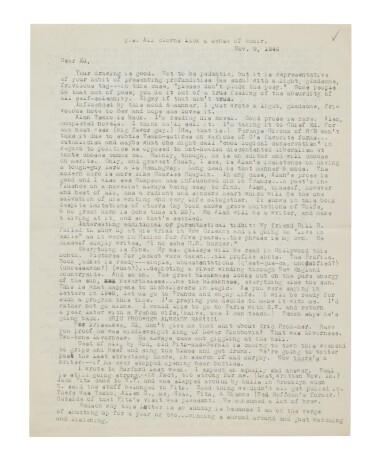Important Modern Literature from the Library of an American Filmmaker
Important Modern Literature from the Library of an American Filmmaker

Kerouac, Jack | Typed letter signed to Ed White; "From now on every word I write counts, and the lesser the better"
Lot Closed
December 8, 05:47 PM GMT
Estimate
8,000 - 12,000 USD
Lot Details
Description
Kerouac, Jack
Typed letter signed ("Jack") to Ed White in Colorado, updating him on his life and recent opinions, musing on his writing
2 pages (278 x 214 mm), on a single leaf of bond paper, [Richmond Hill, N.Y.], 9 November 1949, original typed envelope with Jamaica, N.Y. postmark; light creasing at folds, some loss at tear point of envelope.
An extraordinarily wide-ranging, insightful letter which reveals Kerouac's evolving thoughts on writing.
Kerouac's commences with by complimenting and critiquing a drawing sent to him by Ed, and follows with a close analysis of his classmate, Alan Temko's, latest novel ("Good prose is rare"). Temko was to appear in On the Road as Roland Major. Temko's only "gravest fault", for Kerouac, is "having a tough guy hero a la Hemingway", following with "Long dead is that manner & mode." (in lot 45, he calls him "Hemingway Temko").
William Burroughs' ill-fated time in Mexico is referred to, "[he] is going to "live in exile" as it were in Mexico for five years." Having skipped trial in New Orleans the author went to Mexico City with his wife, Joan Vollmer, and their children, where he would drunkenly shoot and kill her in September 1951. He goes on to discuss the dust-jacket design of his upcoming debut, The Town and the City, "simple, unostentatious...depicting a river winding through New England countryside."
Kerouac expresses his requisites for a French wife: "naive, one I can teach." He then lists people he is seeing or has seen, including Fitzgerald, Burford, Ginsberg, and Temko. The letter flips between energetic chit chat, "old Fitz-ass-Gerald is coming to town this weekend to gripe and beef and sing the blues and get drunk" and broader philosophical statements, "Woes are just water, worry but a wart. Maybe a true heart exists somewhere and I can get to achieve it, without shitting all over the street." From this Kerouac segues into a section distilling his literary philosophy and aims, both anticipating and manifesting his climacteric, pioneering writing style that would be triumphed in On the Road:
"...my ideas of art are changing too...From now on every word I write counts, and the lesser the better...I can no longer bear the dull tense of naturalism (he said, she said, they said) nor the haggling long details that everybody knows anyway. I want every line to shine and to be something the reader did not know before. And that I did not know before."
Kerouac concludes with a nostalgic, reflective passage on his time at Columbia, “[M]y Columbia life was never a Columbia existence, but a ragged tattered madness on its periphery...I just don't feel like a Columbia man...Everybody else has fond memories.” He relates his difficulty finding friends or fitting in with the football team, but then rationalises these feelings of exclusion with the statement, "This is the way that men feel about their lives in general, though, so that's allright, and that's that."
A precious survival of the young Kerouac's fleeting thoughts, feelings and interactions.
REFERENCE:
Not in Charters, presumably unpublished
PROVENANCE:
Ed White (recipient) — Christie's New York, 7 December 2022, lot 207 (undesignated consignor)
